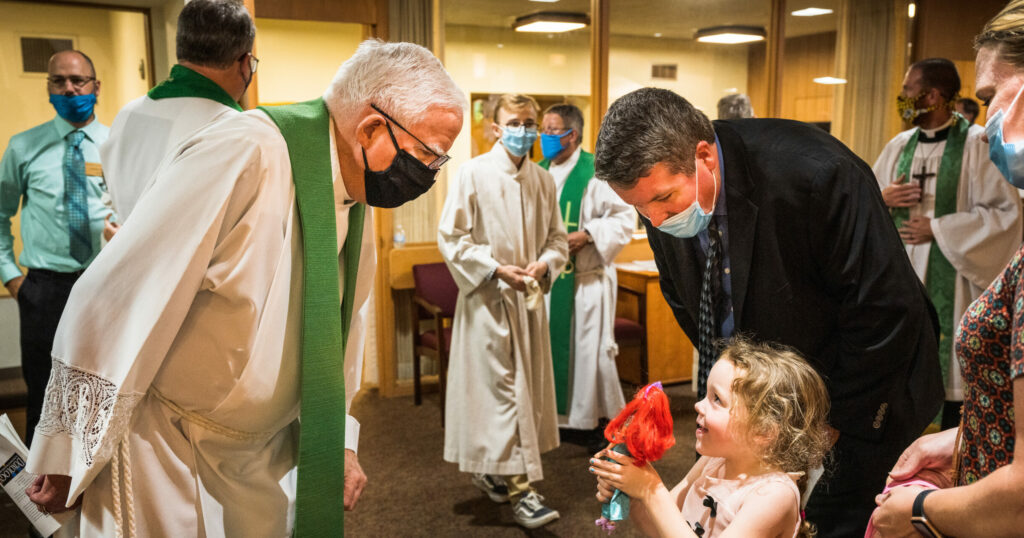This article originally appeared in the February 2023 print issue of The Lutheran Witness.
When you sit down in your pew this coming Sunday, do you see the pew with five persons in it? It is a young family, and how lovely they look. Notice the other pew with 10 persons, with people happily crowding together. Fellow worshipers are a delight to behold.
That joy is not tempered by knowledge of sickness and death. It would not surprise you that one of those sitting in the row ahead is receiving chemotherapy for cancer. If you knew that, you might share a smile and ask how things are going. Likewise, it would sadden but not shock you to learn that a longstanding member succumbed to the disease that afflicted him so many years. Certainly you would join the congregation in prayers for the sick and for the families of those recently departed. Illness and death are sad, but we do not shrink from them in fear. We know that “death doth pursue us all the way,” but we also are confident in our salvation. Just so, the comfort and consolation of the church blesses those who suffer and who grieve.
Now look forward with new eyes. Most of us do not see many of those who are suffering, even though they are right in front of us. We do not ask about their suffering, we do not offer comfort and many services do not include a prayer for them. I speak of those who experience mental illness.
In that pew of five, one of them has been experiencing a serious depression. In the pew with 10, one suffers severe anxiety and another struggles with a trauma. Another row contains the older couple who lost an adult child to suicide last year. The young woman behind you misses church often because her child with severe autism makes it incredibly difficult for her to come. Mr. Smith, the 68-year-old widower, worries what will happen to his adult daughter when he is gone. She was diagnosed with schizophrenia.
Churches are wonderfully comforting to those with physical illness and to those whose loved one died. I pray this article will help churches, pastors and laity alike offer the same comfort to those who are affected by mental illness.
Research shows that one in five adults, and one in six children, will experience a mental illness in any given year. Over the course of a lifetime, one in three persons will be affected. Anxiety, depression, substance misuse and trauma-induced disorders account for most cases. Less common disorders include autism, cognitive impairment, schizophrenia and bipolar disorder. Thus, if your church has 500 members, in any given year as many as 100 might experience a mental illness.
In other words, everyone is close to someone struggling with a mental illness. And more than just the individual suffers. Mental health problems affect families and caregivers. The families of persons with mental illness might need to dedicate an enormous amount of time and energy to their care.
The happy news is that treatment helps. Treatment can alleviate or cure anxiety, depression and trauma. Persistent, serious mental illnesses such as schizophrenia or bipolar disorder cannot usually be cured; hence, they are persistent. But they can be greatly helped or managed. Furthermore, those with mental health problems are greatly comforted by talking with others and experiencing simple Christian kindness and consolation. When someone experiences a physical illness, he or she often seeks treatment. But persons with mental health problems often do not.
Because of society’s attitudes toward mental health problems, many suffer in silence. They keep their suffering to themselves. As a result, perhaps half of all persons with mental illness do not seek treatment, even though it would help. As a result, although you know people in your church are experiencing mental health problems, you likely do not know who they are. They probably have not told anyone — not the pastor, not the church secretary, not an elder. These fellow church members mourn privately and do not let themselves be seen. Instead, they suffer quietly because of the shame that society attributes to mental illness. They fear what others will think.
Society often holds derogatory ideas about mental illness. For example, many think that persons with mental illness are dangerous. While those with severe mental illness may commit acts of violence, a person with mental illness is more likely to be a victim than a perpetrator of violence. Others think that, in some way, the person with mental illness did something wrong to cause the mental illness. Or, perhaps, there is a special weakness in such persons; they were not strong enough to fight off, avoid or outrun the illness. Others blame parents and families for mental illness in their children.
Although the church does not teach these things, those with mental illness hear these messages in society. Christians might apply these ideas to themselves, especially the idea that mental illness is somehow deserved. They might say to themselves: “I must be suffering because my faith is weak.” They might think that God is punishing them by afflicting them this way.
While illness — including mental illness — does not result from specific sins, Scripture does teach that all sickness and disease does result from the sinful condition of man. Adam’s sin broke the body and the mind of man, and every human inherits this broken condition. And while we suffer from this general sinful condition, God does not send mental illness any more than He sends cancer as a punishment for a particular sin. Christ has borne all the punishment for sin in His body on the cross. The church can help those who blame themselves by pointing them to Christ’s punishment on the cross for all the sins of mankind.
The church can help in many ways. Those struggling with mental health needs or family members caring for them need the consolation of their church. It might seem daunting to help those in emotional distress, but Lutherans know already how to do this. Simply follow Christ’s great command: “Love one another” (John 13:34). You and your church can love those with mental health needs by seeing them, by listening to them and consoling them, and by offering advice to them if needed.
See them in your church. You know them, but you likely do not know about their struggle because they have not told anyone. But we can invite them to show themselves. Your church can start with simple acts. Include petitions in the prayers for those in emotional distress and share bulletin announcements about the availability of local mental health resources. Defend those suffering with mental illness by admonishing anyone who ridicules mental health problems as trivial, pathetic or frightening. Encourage everyone to speak with Christian compassion about emotional distress, as they likely do about physical illness. Dedicate a Bible study to mental health problems. Study Martin Luther’s letters to those suffering mental health problems. Host a Q&A with a mental health professional or raise money for Lutheran Social Services.
All such acts — whether weekly or occasional, whether large or small — are noteworthy. They declare forthrightly that your church is not afraid of mental illness, is not ashamed of those that struggle with one and is open to talking about those struggles. Such actions will clearly proclaim to those in distress, “We know you are here, and we welcome you with love.”
Console those in distress by assuring them that Christ bore all shame on the cross, whether or not that shame is warranted. Help them understand that being a Christian does not protect one from mental health problems. Remind them of the many Bible stories about those who struggled with anxiety and distress. Even those who talked with God suffered. Bear witness to the stories of Abraham, Moses, David, Peter and others. They had, and we have, the surety of God’s love, which is a great joy. And none should be allowed to think that struggle means God has abandoned them. Quite the contrary, Christ assures us we will struggle. Christ says, “Take up [your] cross and follow me” (Matt. 16:24). Christ also assures us that He has won our victory and our freedom: “In the world you will have tribulation. But take heart; I have overcome the world” (John 16:33). And He says, “So if the Son sets you free, you will be free indeed” (John 8:36).
Finally, you and your church can give good counsel about maintaining and recovering mental health. Healthy eating, adequate sleep, active social lives and physical exercise are essential to health. Those in emotional distress often neglect these things. Feeling depressed and anxious might make someone imagine that other members at church do not want to see them every Sunday. Encouragement (“Let’s go out on Friday” or “Join us for church on Sunday”) can help greatly. For in the gathering of His saints around His gifts, Christ proclaims and grants forgiveness. If sin sits at the root of all disease and sickness, it also sits at the root of mental illness. And in the Christian church, on Sunday morning, our Lord comes among His people and proclaims forgiveness for all sin, removes all shame and bestows life and salvation.
Some will need the help of a qualified professional to return them to mental health. This counsel has two parts. First, assert that professionals are trained to help. Second, help the person accept that it might take a while to find the right therapist. Encourage them to keep looking if the professional they are seeing is not helping.
Mental health problems are distressing and impairing. Persons struggling with mental health problems are in your church. There is much you and your church can do to help those in need, which entails acting in love, with compassion, without fear. And in all things, point them to Christ, who was crucified for them.






My adult son has schizoaffective disorder & has attended Mo synod Lutheran Church. He has attended nearly 4 yrs. Very seldom missed a service until 2 mos ago. The pastor does know he has this disorder & was aware when he was briefly hospitalized. He has not reached out or an elder to my son. I updated him to his situation recently & he said he would be happy to meet with him. He does not leave our house. Had hoped there would be some contact. Am disappointed.
“I believe that God … has given me … my reason, and all my senses, and still preserves them.”
I memorized that dutifully as a young teenage catechumen. Yet with respect to what God “preserves,” the normal course of human life is such that in time our faculties are diminished or lost through illness, injury or age. To acknowledge that is by no means to blame God, but rather points to the kind of mature understanding expressed by Job:
“The LORD gave, and the LORD has taken away; blessed be the name of the LORD” (Job 1:21 ESV)
Absolutely the best article ever shared on Mental Illness!! I participate in NAMI ( National Alliance for Mentally ill) and this ” God” part is NEVER mentioned, unfortunately !! Well done !!👏🏽👏🏽👏🏽❤️
Just so readers do not misunderstand: NAMI acknowledges that “spirituality, religion and faith can help some individuals live well with mental health conditions.”
Source: https://www.nami.org/Your-Journey/Individuals-with-Mental-Illness/Faith-Spirituality/
I think that substance abuse disorders can be the result of a specific sin, such as drunkenness. However, I suffer with bipolar disorder and I often feel as though I am being punished. One LCMS church I recently attended had 2 or 3 psychiatrists in the congregation. What a blessing!
Might some pastors who read this be able to post some recommended prayers or collects for those with mental health? It would be great to have twelve of these that pastors could use, and put them into a rotation in their church year.
Great article! However, autism is not a mental illness. It is a neurological and developmental disorder.
A most excellent article! A breath of fresh air for people with mental illness and, if I may, I’d also like to include attention for people with intellectual disabilities.
Absolutely! A teen with intellectual disabilities would come to church with her mom and other siblings only during the Advent and Lent services. I became her friend and we would sit together. This gave her mom a break (and a more worshipful experience). The young woman was a blessing to me as I saw her grow in her participation and understanding throughout the time we worshipped together.
This was a discussion long overdue. Christians often face a crisis of faith when trials come into their lives. Some might say that we are supposed to be people whose faith is unshakable and we should be able to persevere, even as the book of James declares, “counting it as joy.” After all, trials develop patience, don’t they? But the trials and temptations of this life can cause the mind great anxiety and trauma, and even where faith is strong, the wounds are often too deep for many. My father suffered from PTSD as a result of his wartime World War Two experiences, and it affected his mind. He had faith in God, but he still suffered. After years of counseling at the VA, he recovered, by the grace of God, and went on with his life. What you said about the person in the next pew in church; it is true, only God knows what they are dealing with. I think that people are often burdened with guilt, sorrow, regrets, and anxieties that they silently endure to their graves. There are degrees of “mental illness.” Not all are debilitating, but they still remain in our memories. If we could just bring them to Jesus, and maybe talk to a Christian counselor, it is a way to ease one’s mind. I know that the Lord understands our struggles of the mind, and we need not face them alone. Soli Deo Gloria